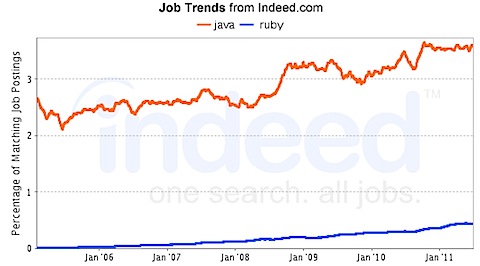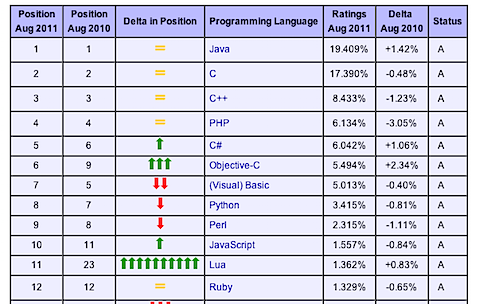We've been very busy over the past week, what with more Cloud/OpenShift activities, getting ready for JavaOne and JUDCon London, it's hard to know where to start. So let's dive in chronologically
- So we finally officially announced JUDCon London 2011, which is happening alongside JAX London. The Call for Presentations is short this time, due to some logistical issues, so you should hurry to get your submissions in and get registered!
- The BoxGrinder team made another release, this time version 0.9.5 (if they follow the TorqueBox naming scheme then version 1.0 may happen sometime in 2014!) The biggest change is 0.9.5 is Fedora 16 build support!
- Of course one of the bigger stories last week was when Heroku joined the Java PaaS Club. However, as Rich Sharples pointed out so eloquently, they weren't exactly very enthusiastic about it. Rich wondered why then did they bother? Of course he knew the answer and pointed it out: "Only Java gives developers such a broad range of tools, technologies and APIs – both commercial and open source. Only Java gives you Open Standard enterprisey features like Transactions, Object Persistence, Messaging, Security, Integration, scalability and high availability for when you need them." Along with a couple of nice diagrams to illustrate:
- Mark Little also posted a couple of articles about the Heroku announced, starting first with why an application server actually makes a much better Platform as a Service. As with Rich, the initial article also pulls apart some of the Heroku announcement. "Furthermore, this recent announcement is a great example of how not to build an enterprise PaaS. It's interesting to see that the example used in the announcement is HelloWorld. Somebody more cynical than I might think that it says something about the complexity and enterprise nature of the applications they can support being deployed! Now of course you can argue that you can pull together more feature rich stacks and frameworks on such thin PaaS implementations. Yes, rolling your own stack is a much better use of a developers time compared to getting one out of the box!"
- Mark's subsequent article (Why to need an enterprise platform for a PaaS) goes into much more detail on the various aspects of something like AS7 that really make it a more solid foundation for any PaaS, no matter what the language. "EE6 is a good standard that brings these and more together into a well defined stack. And AS7 is the best implementation of that standard that puts to death the old myths and FUD that Java EE is bloated and unusable ."
- Mr Security, Anil Saldhana, gave us a couple of posts about security in AS7 (SAML based) and a general posting about "man in the middle attacks", prompted by a recent issue around Google SSL certificates. Definitely worth a read, even if you're not using JBoss!
- Alessio Soldano, JBossWS project lead, had some good news for us too this week: "I've recently been offered to join the Apache CXF PMC and I accepted." Congratulations Alessio!
- Big news too was the first developer release of the 1.1 version of IronJacamar! Jesper had this to say: "On the usability front we really want to drive the way that resource adapters should be tested, so improved integration with the Arquillian and ShrinkWrap projects will have a high priority. You will see up-coming releases where having a requirement for on-disk deployment descriptors will be eliminated by using the ShrinkWrap Descriptors project and our own extensions for IronJacamar specific deployment metadata. Another area is better tooling for JCA based projects. We already have the code generator and the validator tools, but better integration with JBossTools will be important. There will also be new tools that will help people migrate from earlier releases of the JBoss Application Server. The 1.1 series will still target the Java EE Connector Architecture 1.6 specification, but we will take a look at adding support for some of the more exotic features of the specification which are optional in the sense of TCK testing."
- Brian Leathem started a new series of articles this week on the Richfaces 4 Component Development Kit (CDK). The first entry is more about setting the scene for what will follow, but you might still find it interesting and definitely worth bookmarking for future entries. As Brian says: "Before I get into specific examples, I’d first like to motivate the series by describing what exactly the CDK is and the problems that it solves. If you already know all about JSF components, and you want to get straight into using the CDK, skip this blog post! - the rest of the entries in this series will deal purely with implementation details."
- And finally, the Hibernate team have been busy yet again! There's a new CR for Hibernate Core 4.0.0, and Emmanuel announced the 2nd Alpha release of Hibernate Search 4.0.0. Apart from bug fixes, it includes some nice new features such as near realtime searches ("Taking advantage of Lucene's new Near Realtime advancements, Hibernate Search can now search the uncommitted buffers which are still in memory, avoiding costly commits and let the IndexWriter flush periodically as it needs for optimal memory management. Note that Hibernate Search still makes sure that a Query will only see fully committed transactions (no dirty reads).") and being able to add @IndexEmbedded on collections of basic types. Lots more in there, so check it out!
OK, that's it for this week. Don't forget that you can keep up to date with everything that's going on by watching the aggregated JBoss feed!

